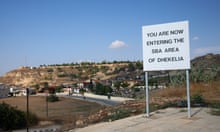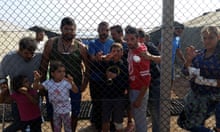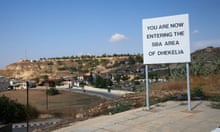The UN refugee agency, the UNHCR, has said that the UK is legally obliged to resettle more than a hundred Syrian refugees who arrived by boat at a British military base in Cyprus, contradicting claims from the Ministry of Defence (MoD) that they were a Cypriot responsibility.
Two overloaded wooden boats carrying 114 refugees from Syria, including 28 children, have been transferred to a temporary reception area in the sovereign base at Akrotiri on the southern coast of the Mediterranean island. According to the Cypriot coastguard, the refugees were abandoned offshore by people smugglers and left to fend for themselves.
The arrival on British territory of asylum seekers fleeing the Syrian conflict intensifies the scrutiny on the UK’s response to Europe’s worst refugee crisis since the second world war. David Cameron has offered to take in 20,000 Syrian refugees over five years – significantly less than most other western European countries, though the government has pointed out it gives more aid for refugee camps along Syria’s borders.
Reacting to the arrivals at Akrotiri, the MoD said: “At the moment our key priority is ensuring everybody on board is safe and well. We have had an agreement in place with the Republic of Cyprus since 2003 to ensure that the Cypriot authorities take responsibility in circumstances like this.”
Asked whether the refugees would be able to claim asylum in Britain, an MoD official said: “That’s not our understanding.” A spokeswoman for the Home Office also stated: “The resettlement of refugees landing on the southern bases in Cyprus is not the responsibility of the United Kingdom.”
But the UNHCR said in a statement that the 2003 UK-Cyprus memorandum made it clear that “asylum seekers arriving directly on to the SBA [Sovereign Base Area] are the responsibility of the UK but they would be granted access to services in the republic at the cost of the SBA.”
The UNHCR said it had not been able to visit the refugees because they were on a military base, but that high-level talks were under way between British and Cypriot officials and that the agency had offered to mediate.
The 2003 agreement states: “The United Kingdom, through the SBAA [SBA administration], will endeavour to resettle persons recognised as refugees or granted any other form of international protection in countries willing to accept those persons, and not later than one year after the decision granting the relevant status has been taken.”
However, 67 refugees from earlier arrivals beginning in 1998 are still in legal limbo, living on a British base in Cyprus having been denied asylum in the UK.
Kyriacos Mavri, the commander of the Cyprus coastguard, told the Guardian that the refugees who arrived at Akrotiri in the early hours of Wednesday had been left to fend for themselves in two fishing boats after travelling from Turkey.
“The people who were trafficking them abandoned them in ... fishing boats about one or two miles from the beach just outside the SBA. They left in a fast boat,” he said. “We were told they were all from Syria. There were 67 men, 19 women and 28 children. Many of them had iPhones with them and they were very well dressed. Everybody was OK, they didn’t have any health concerns.”
George Kiteos, a police spokesman at the base, which has been used to launch airstrikes against Islamic State in Iraq, said: “They arrived on the coast in the bit of the base that is closed off, were brought to shore and are currently in the process of being identified and screened,” he told the Guardian. “What happens to them next is up to the politicians to decide.”
According to Cypriot sources, the fact that Akrotiri is being used in the air campaign against Isis will affect how the refugees are treated, as they could be seen as a security risk. Insiders, who did not want to be named, said accommodation in the base’s military zone could be found to house the refugees if necessary.
A Cypriot government official said cooperation on the matter would be dictated by the memorandum of understanding between the Republic of Cyprus and the British-run bases. “We are ready to help if requested … for the moment all the individuals are under the control of the bases. We have no involvement whatsoever,” said Olivia Michalidou, a spokeswoman for the island’s civil defence department.
An MoD spokesman said it was unclear where the refugees had travelled from, but a police official told local media that they “appeared” to have come from Syria.
The base is one of two sovereign territories retained by Britain on Cyprus, a colony until 1960. Britain started using Akrotiri to bomb Isis targets in northern Iraq in September 2014.
Cyprus has received hundreds of refugees from Syria, but this is the first time any had arrived at the Akrotiri base, which is about 150 miles from the Syrian port of Tartus.The news site inCyprus said two small boats had been spotted off the coast of Akrotiri at about 6.30am and were shepherded back to the shore by the Cyprus coastguard.
The MoD said: “Events like this underline why it is important for us to develop a comprehensive approach to the migration crisis, working with our international partners to provide humanitarian assistance in Syria and neighbouring countries, to disrupt the trafficking gangs and to address the root causes of instability that cause people to seek a new life elsewhere.”









Comments (…)
Sign in or create your Guardian account to join the discussion